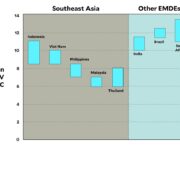Philippine stocks: buy, sell or hold?

The Philippine Stock Exchange Index (PSEi) has been highly volatile this month—falling as much as 5.8 percent before rebounding to almost 6,000.
Given this backdrop, it’s understandable that investors are unsure about what to do. Is the recent rebound of Philippine stocks a sign that the worst is over? Or is it an opportunity to trim exposure?
The answer depends on the kind of investor you are.
If you are a trader looking for quick short-term gains, this is not the environment for you. Fundamentals have not improved—and may even weaken—making a sustained rally unlikely. In this case, it may be wise to use the current bounce to take profits or reduce exposure.
Third-quarter gross domestic product grew just 4 percent, far below expectations, as government spending slowed sharply amid the corruption probe and household consumption rose only 4.1 percent, its weakest since early 2021.
Corporate earnings reflected the same sluggishness: most companies missed analyst estimates, while median growth was less than 5 percent, dragged by telcos, consumer firms, power companies and gaming operators.
External risks are rising too. US economic indicators are weakening, with serious auto and credit-card delinquencies climbing to 5 percent and 12.4 percent respectively—levels last seen during the global financial crisis.
Layoffs have also surged, while payroll growth has softened.
Finally, stress in private credit is increasing as recent high-profile bankruptcies at First Brand, Tricolor and Renovo are leading to massive losses among shadow banks. This, in turn, is expected to lead to heightened risk aversion among investors.
Concerns about a potential artificial intelligence (AI) bubble are also building. Big Tech continues to pour hundreds of billions into data centers and other AI infrastructure despite limited real-world adoption.
A recent MIT study found 95 percent of firms saw no measurable returns from AI, while losses of OpenAI (ChatGPT’s owner) widened to an estimated $7.8 billion in the first half of 2025 despite higher revenues.
With the S&P 500 trading well above its historical average valuation—and the “Magnificent 7” now accounting for 40 percent of the S&P 500—any reversal in sentiment could trigger a sharp correction that would spill over to emerging markets, including the Philippines.
If, on the other hand, you are a long-term investor building wealth for retirement or for your children, then staying invested makes sense. Economies move in cycles, and today’s challenges will eventually pass.
Valuations also offer a strong argument for staying invested. The PSEi is trading at just 8.8x forward earnings, a level that’s close to the trough reached during the 2008 global financial crisis.
In fact, before the recent rebound, the index had fallen back to near-pandemic lows even though the economic backdrop is not as bad.
Many blue-chip stocks led by property and consumer stocks are also priced below their 10-year lows. This is despite earning higher profits today.
At the same time, a number of companies offer dividend yields that exceed those of government bonds, making them appealing sources of passive income. These yields also give investors a cushion, making it easier to stay patient while waiting for prices to recover.
While we cannot predict what catalyst will drive the next sustainable bull market, buying stocks while they are cheap ensures you won’t be left behind when the recovery finally happens.
That said, long-term investing works best when you size your exposure properly. Avoid using margin or leverage and keep only an amount in equities that you are sure you won’t need anytime soon. The market is very volatile right now and cheap stocks can still get cheaper. Holding too many stocks in a volatile environment can cloud your judgment—turning opportunity into panic if prices fall further.
It may also be prudent to raise some cash. With the US economy and markets showing signs of strain, conditions could worsen before they improve. Having liquidity gives you the flexibility to take advantage of any irrational selling should the Philippine market be dragged lower by global contagion.





















